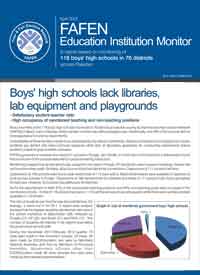ISLAMABAD, May 18: Sixty-nine visits were made by government officials/elected representatives to 100 police stations monitored across the country during January-March 2012 which means at least 31 were ignored altogether, says a Free and Fair Election Network (FAFEN) report.
The report released Thursday said that informed and regular government oversight is indicative of authorities’ interest and helps ensure institutions perform better.
During the monitored quarter, FAFEN governance monitors visited 100 police stations, 65 of which were in Punjab, 18 in Khyber Pakhtunkhwa (KP), nine in Sindh and eight in Balochistan.
Of the total visits by government officials/elected representatives, 52 were made to police stations in Punjab, 12 in KP and five in Balochistan but none to nine police stations monitored in Sindh.
The most visits were by District Police Officers (42), followed by Regional Police Officers (7), provincial minister, federal minister, MPA and a leading area notable (1 each). An additional 16 visits were by some other elected representatives/government officials.
Most of these visits were routine and monitoring ones while some were surprise visits and a few others were meant to check attendance and issues faced by staff and inmates.
Ignorance and non-compliance with government’s Access to Information Policy was also observed at police stations monitored in Punjab and Sindh. Although it has been several years since this policy was adopted, Station House Officers (SHOs) at 22 police stations in Punjab and two in Sindh were not aware of it. On the other hand, another 16 police stations in Punjab and three in Sindh did not have draft of Access to Information Policy.
Thirty eight police stations in Punjab and eight in Sindh were not maintaining a separate register to record requests seeking information. Also, there were no Information Access Officers appointed at 38 police stations in Punjab and seven in Sindh.
Copies of challans presented in courts were not accessible to public at 46 police stations in Punjab and one in Sindh. The situation with regard to FIRs was better though, copies of which were accessible to the public at 62 police stations in Punjab and seven in Sindh.
Police record showed that 41 of the 65 police stations monitored in Punjab and seven out of nine in Sindh never received any request for information.
The occupancy rate at police stations was found to be satisfactory with at least three-fourths of the sanctioned positions occupied in each region. Balochistan had the highest occupancy rate of 91% of male staff, followed by KP (87%), Punjab (82%) and Sindh (75%).
FAFEN observers reported that all SHOs were cooperative and allowed observation of police stations. The monitoring showed electricity connections were available at all but three police stations but five had no fans and 26 were without arrangements for clean drinking water. Ninety four police stations had telephone/wireless connections.
There were 520 vehicles at 99 police stations, an average of five vehicles per station. There were only four police stations that were not getting fuel from the relevant department.
FAFEN observers interviewed one person at each police station to assess police behaviour. Seventeen people complained the law enforcers sought money for registering FIRs while 13 said police asked for non-fiscal benefits.
People at 22 police stations complained police sought logistical support for investigating registered cases. Eleven people said police avoided registering FIRs. Moreover, 10 people complained they were asked to bring stationery to have their FIRs lodged.


